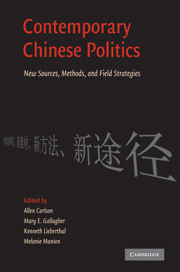Book contents
- Frontmatter
- Contents
- Tables and Figures
- Contributors
- Abbreviations
- Introduction
- Part I Sources
- Part II Qualitative Methods
- 7 The Worm’s-Eye View
- 8 More Than an Interview, Less Than Sedaka
- 9 Cases, Questions, and Comparison in Research on Contemporary Chinese Politics
- Part III Survey Methods
- Reflections on the Evolution of the China Field in Political Science
- Glossary
- References
- Index
7 - The Worm’s-Eye View
Using Ethnography to Illuminate Labor Politics and Institutional Change in Contemporary China
Published online by Cambridge University Press: 05 June 2012
- Frontmatter
- Contents
- Tables and Figures
- Contributors
- Abbreviations
- Introduction
- Part I Sources
- Part II Qualitative Methods
- 7 The Worm’s-Eye View
- 8 More Than an Interview, Less Than Sedaka
- 9 Cases, Questions, and Comparison in Research on Contemporary Chinese Politics
- Part III Survey Methods
- Reflections on the Evolution of the China Field in Political Science
- Glossary
- References
- Index
Summary
In her 1994 review of the state of the Chinese politics field, Elizabeth Perry notes that the normalization of Sino-American relations in 1979 presented a new generation of American political scientists with an opportunity to “pursue a new brand of scholarship, based upon field work and documentary materials available only in the PRC.” Moreover, given the “extraordinary diversity that makes up the Chinese political experience” and the maturation of the field, she argued that Chinese politics might finally “be fertile soil for the formulation of new analytical approaches” (Perry, 1994b: 704, 712).
Since the publication of Perry’s article, China has not only accelerated its economic reforms but also has inaugurated a new generation of national leaders, joined the World Trade Organization, and become the world’s second largest economy. These profound changes, brought about by a matrix of global, national, and local forces, are opening up more avenues for research, dissolving and reconstituting old boundaries, and forcing us to reconsider how we understand issues that have been central to the field of Chinese politics. For example, how does state action impact economic and social transformation, especially in areas where the “reach of the state” has been historically weak (Shue, 1988)? What forms can increased political participation take and how might they contribute to greater political stability and legitimacy? How are market-oriented activities reshaping institutions, practices, and social structures, especially at the local level? In what sense can reemerging and evolving social identities provide a basis for effective collective action? The Chinese case offers a valuable perspective on these and other questions and may potentially deepen our knowledge of how similar processes affect citizens in other regions of the world.
- Type
- Chapter
- Information
- Contemporary Chinese PoliticsNew Sources, Methods, and Field Strategies, pp. 129 - 144Publisher: Cambridge University PressPrint publication year: 2010



